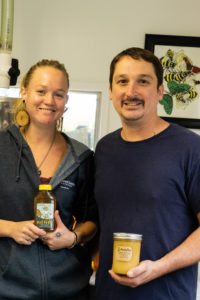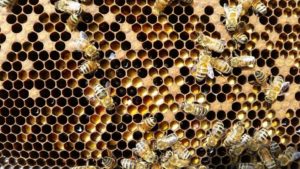
Kaylee and Jason Moody, owners of Moody Bees Honey in Madelia, Minnesota. Photo courtesy of Moody Bees Honey.
By Gina Kerzman, USDA
Kaylee and Jason Moody are beekeepers and owners of Moody Bees Honey in Madelia, Minnesota. These first-generation farmers have been in business for five years.
Starting the Business
Kaylee and Jason got started in the beekeeping business when they moved onto an old farm site near Madelia. The couple grows a lot of their own food and switched to a permaculture system, focusing on the whole system rather than one species, by planting perennial food crops, building swales for water catchment, deep mulching for nutrients, and feeding soil microbes.
Moody Bees Honey began selling their products in 2014. Their current products include table honey, raw honey, and honey infused with garlic, lavender, or hot peppers. The peppers and herbs used for infusion come from other local producers including Alternative Roots Farm and Under the Sun Herbs.
“I’m a local business, so it’s important to me that we keep money in the community,” said Kaylee. “We keep each other and our families in business.”
According to Kaylee, hot pepper- and garlic-infused honey can be used for cooking. Other products include candles, lip balm, salves, and lotion bars.
“Every part of the bee’s work gets used. Nothing goes to waste,” Jason said.
Growing the Operation
In 2015, they applied for and received their first microloan through USDA’s Farm Service Agency (FSA), which helped them expand their operation from four hives to 30 and to purchase honey processing equipment.
They slowly grew their operation between 2015 and 2018, receiving a second microloan to increase their total number of hives to approximately 300.
Kaylee was also enrolled in the Farm Business Management Program, a program offered through a community college that partners with FSA. Through the program, the farm business manager assigned to Kaylee helped her keep accurate financial records, as well as financial reporting requirements for her loans.
“It was difficult at first, coming from a small non-conventional type of farm and trying to navigate the waters, but it has really turned around and its awesome to have that resource available,” said Kaylee. “I think more small farmers should consider FSA programs as an option and a resource.”

Moody Bees Honey began selling their products in 2014. Photo courtesy of Moody Bees Honey.
Keeping the Bees
The last five years have been difficult on their bees because of the winter weather. FSA’s Emergency Assistance for Livestock, Honeybees and Farm-Raised Fish Program helped them recover from the losses it caused.
“In the fall we were having 60 to 75 percent losses in our colonies,” said Kaylee. “It was very devastating. We were very thankful for the success we had with the program through FSA.”
To avoid further losses, Jason and Kaylee decided to move their bees to east Texas during the winter months.
“I always joke that I am now a snow bird at the age of 27, and I’m pretty stoked about it,” she said.
Community of Comradery
Kaylee is president of the South-Central Minnesota Beekeeper’s Association that meets to talk about issues facing beekeepers.
“It wasn’t just us seeing those losses, it was all across southern Minnesota,” explained Kaylee. “We helped encourage those folks into going to FSA for their losses, too.”
Jason also enjoys the comradery of the beekeeping community.
“Being part of the local bee keeping community is like being part of a big family,” Jason said. “Everyone is always willing to help each other out.”
More Information
USDA offers a variety of risk management, disaster assistance, loan, and conservation programs to help agricultural producers in the United States weather ups and downs in the market and recover from natural disasters as well as invest in improvements to their operations. Learn about additional programs.
For more information about USDA programs and services, contact your local USDA service center.
Join the Conversation
For the digital version of this blog, visit #FridaysOnTheFarm.
Follow the #FridaysOnTheFarm story series and other news you can use on farmers.gov and our social media channels: Twitter, Instagram, YouTube, Flickr, and Facebook.





